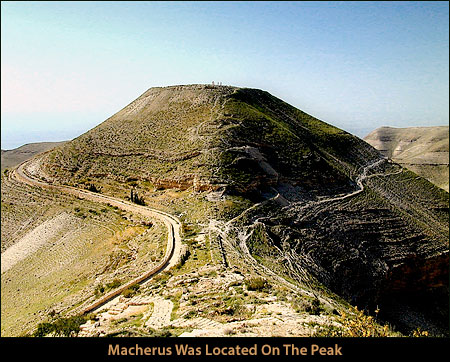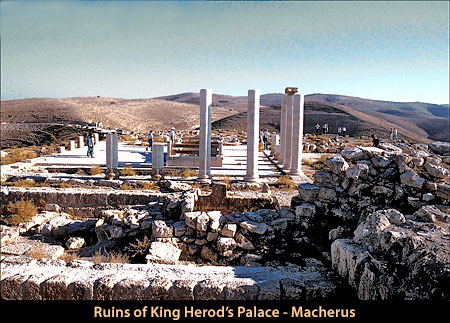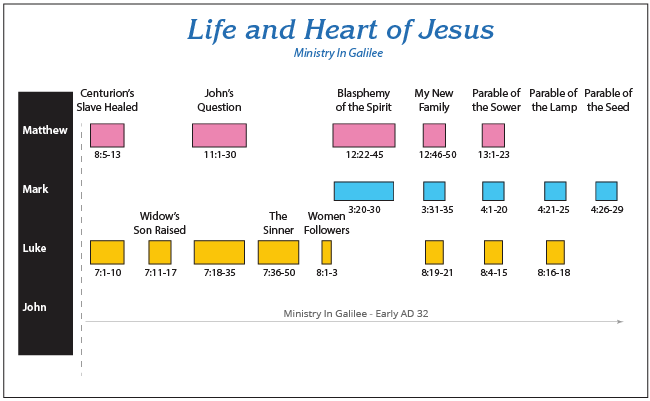Miracles capture the attention of people. That is an obvious statement. So after Jesus healed the centurion’s slave and restored the life of the widow’s son, the news about Jesus spread throughout Judea and the surrounding area. Newspapers, magazines, television, and radio did not exist at the time of Jesus. Information was passed along by word of mouth. Travelers from one community would bring information and news from other towns. The news about Jesus traveled the same way. Eventually the news about Jesus’ miracles reached the ears of John the Baptist who was imprisoned in one of the palaces of King Herod which was also used as a prison. The Jewish historian Flavius Josephus states that John the Baptist was imprisoned in the palace of Macherus (Antiquities of the Jews, XVIII, V, 2). The palace was built in 90 B.C. and was located about 24 km southeast of where the Jordan River flows into the Dead Sea. John had been in prison for about twelve to eighteen months when news about Jesus disturbed him. We will discover why in a few minutes.

Thoughts In Prison
John had plenty of time to dream about the past, what the past might have been, and what he had believed the future would be like. His birth had been extremely unusual. An angel had visited his father Zacharius, a priest, in the temple when he was preparing to burn incense and told him that his aged wife would give birth to a son who should be named John. The angel Gabriel announced that John would perform his ministry in the spirit and power of Elijah (Luke 1:8-17). His birth was unusual because His mission was to be unusual.
His father did not believe the angel. As a result he was not able to speak until John was born. His birth was a miracle because his mother was past her child bearing years (Luke 1:8-17).
After John was born, his father prophesied by the power of the Holy Spirit and announced that John would go before the Lord to prepare the way (Luke 1:76-79). He announced the fulfillment of Malachi 3:1 and Isaiah 40:3.
Behold, I am going to send My messenger, and he will clear the way before Me . . . Malachi 3:1a (NASB)
A voice is calling, “Clear the way for the LORD in the wilderness . . .” Isaiah 40:3 (NASB)
Since John’s mother was very old, we do not know how long she was able to teach him; but we can be sure that John knew he was the one who was to go before the coming Messiah.
He was the one who was to call the people to repent and prepare their hearts for the Messiah the prophets had promised would come. The Jews believed that the Messiah would rescue them from foreign control. Matthew 1:4-8 records John’s persistent message,
Repent, for the kingdom of heaven is at hand. Matthew 3:2 (NASB)

His message was loud and clear. He was announcing the coming of the Messiah and His kingdom. He was dressed in strange clothes as implied by Jesus later during His ministry in Luke 7:25.
John was a relative of Jesus. His mother, Elizabeth, was related to Mary, Jesus’ mother (Luke 1:36). So John must have heard about Jesus during His youth. Yet John did not know that Jesus was the Messiah until much later. Even though Matthew 3:13-15 implies that John knew Jesus was an extremely righteous man, he did not understand that Jesus was the Messiah. This also suggests that Jesus did not do miracles as a youth contrary to some Gnostic documents. We discover in John 1:31-34 that John had asked God to give him a sign to confirm who the Messiah truly was.
John testified saying, “I have seen the Spirit descending as a dove out of heaven, and He remained upon Him. I did not recognize Him, but He who sent me to baptize in water said to me, ‘He upon whom you see the Spirit descending and remaining upon Him, this is the One who baptizes in the Holy Spirit.’ I myself have seen, and have testified that this is the Son of God.” John 1:32-34 (NASB)
The sign was that the Holy Spirit would descend upon the Messiah – the Coming One. This event occurred at Jesus’ baptism. John 1:27 reveals that John the Baptist also believed that Jesus was God since he said, “He existed before me.” That was a significant statement because John the Baptist was born before Jesus (compare Luke 1:57 to Luke 2:1-7).
Later John the Baptist announced to the crowds that Jesus was the “Lamb of God who takes away the sins of the world” (John 1:29,35-36). Jesus’ ministry began to grow and increase. His ministry increased so much that the Jewish leaders became concerned and apparently attempted to generate competition between Jesus and John. The incident is recorded in John 3:22-30. But John had a divine perspective and a humble heart and stated,
He must increase, but I must decrease. John 3:30 (NASB)
John believed in Jesus and believed that they were on a divine mission.
Then a tragic event occurred. He was put into prison by King Herod because the king did not like John’s messages (Matthew 4:12; Luke 3:19-20). John had rebuked Herod for committing adultery with his brother’s wife Herodius. Historians tell us that King Herod had an affair with Herodius while he was away in Rome. When he returned home, Herod divorced his wife and married Herodius. In response John had publicly denounced Herod. So the king put John in prison in Macherus.
John Has Doubts
John must have thought about these events over and over again while he was in prison (Matthew 11:2). Initially, he must have believed that his imprisonment was just part of their mission or divine cause. But the first few verses of our study (Matthew 11:2-6; Luke 7:18-23) reveal that John the Baptist started having doubts about Jesus.
This report concerning Him went out all over Judea and in all the surrounding district. The disciples of John reported to him about all these things. Summoning two of his disciples, John sent them to the Lord, saying, “Are You the Expected One, or do we look for someone else?” Luke 7:17-19 (NASB)
As the months passed, John must have started wondering if he had made a mistake. As many of us do when things do not go as we expected, he may have started having “second thoughts.” He must have thought, “Why am I still in prison?” “When is Jesus going to start the kingdom?” “When will I be released from my prison?” “How does the forgiveness of our sins fit into Jesus’ plan?” “Why isn’t something important happening?” “Is Jesus really the Messiah?
It is clear from our review of John’s life that he had believed Jesus was the Messiah and God, since he said, “He existed before me.” John would not have declared that Jesus was “the Lamb who takes away the sin of the world” if he was not convinced that Jesus was on a divine mission.
After hearing about the miracles that Jesus was performing, John was apparently either more confused or had more doubts. So he sent two of his disciples to Jesus in order to discover the answer to the question that had been nagging him. He sent his disciples because he did not have a cell-phone, e-mail, postal mail, a fax machine, or any modern means of communication. When his disciples arrived, they repeated John’s question.
When the men came to Him, they said, “John the Baptist has sent us to You, to ask, ‘Are You the Expected One, or do we look for someone else?'” Luke 7:20 (NASB)
In response, Jesus did not preach a sermon about belief, pray for them, give them an electronic sermon, or hand them a book. Jesus simply performed many miracles.
At that very time He cured many people of diseases and afflictions and evil spirits; and He gave sight to many who were blind. Luke 7:21 (NASB)
Then he told the two disciples to return to John and report what they saw.
And He answered and said to them, “Go and report to John what you have seen and heard: the BLIND RECEIVE SIGHT, the lame walk, the lepers are cleansed, and the deaf hear, the dead are raised up, the POOR HAVE THE GOSPEL PREACHED TO THEM.” Luke 7:22 (NASB)
Some have said that John did not have any doubts. They believe that John wanted the question asked in order to help his disciples believe in Jesus. But if we look closely at this last verse, we discover that Jesus did not encourage the two disciples to believe in Him. If the issue was with John’s disciples, then the performance of the miracles should have been enough. But John was the one who had the doubts as indicated by Jesus’ words, “Go and report to John . . .” The miracles were primarily for John. John was the one having doubts. John’s disciples might have had doubts too since their leader was having doubts, but the miracles were designed for John.

Having Doubts?
Have you ever had doubts about Jesus even though you call yourself a Christian? If so, then it is important to know that many in the early church had doubts about Jesus too! Thomas, one of Jesus’ twelve disciples, had doubts after Jesus returned to life and then later believed. His story can be found in John 20:24-29.
In 1 Timothy the apostle Paul writes these words,
If we are faithless, He remains faithful, for He cannot deny Himself. 2 Timothy 2:13 (NASB)
While the words assure us that our salvation depends upon God, the words also indicate that even Christians might waver in their faith towards God. So we should not be surprised to find the following words in the book of Hebrews.
Let us hold fast the confession of our hope without wavering, for He who promised is faithful . . . Hebrew 10:23 (NASB)
The book of Hebrews was written to some Jewish Christians who were also wavering in their faith about Jesus.
Christians down through time have had their moments of doubting. The great preachers of the centuries did too! Here is one such example,
I once told my congregation that I had passed through a season of doubt and fear. One of my elders said to me, “Sir, I am sorry you told the people that. Just suppose you had been swearing or stealing, you would not have told them of it?” “No, I answered: that would be a terrible thing.” “Well,” he replied, “I don’t think it is much worse than not believing God; and, if you go and tell the people that, you are a bad example.” – Spurgeon.
Even the great preacher Spurgeon had moments of doubts. If one of Jesus’ inner twelve disciples and many other Christians had doubts about Jesus, should we be surprised that even John the Baptist had doubts after being in prison for twelve to eighteen months? From John’s point of view, it appeared that the future was now dark. It probably appeared the mission was going in the wrong direction. As a result doubts about Jesus existed.

John’s Problem
John’s fundamental error was that his expectations about the future and Jesus were wrong. His concept of the ministry of the Messiah was in error. His view of the coming kingdom was faulty. So Jesus gives the following beatitude and politely rebukes John with these words,
Blessed is he who does not take offense at Me. Luke 7:23 (NASB)
That is, blessed are those who do not reject Jesus because He is not what they expected and He did not do what they expected.
Today, some want a God who is perfectly holy or good and infinitely loving. Yet, they do not understand that a perfectly good or holy God will hate sin and be morally obligated to remove those who love sin from His presence forever. As a result some take offense at Jesus and reject Him. God provided these words in Isaiah for all of us who think that God should be like us,
“For My thoughts are not your thoughts,
Nor are your ways My ways,” declares the LORD.
For as the heavens are higher than the earth,
So are My ways higher than your ways
And My thoughts than your thoughts.
Isaiah 55:8-9 (NASB). . . You thought that I was just like you . . . Psalm 50:21 (NASB)
Conclusion
Are you having doubts about Jesus? If so, how should you respond? The first place to start is to realize that Jesus helped John believe by performing many miracles. In John 20:28-29 we read these words,
Therefore many other signs Jesus also performed in the presence of the disciples, which are not written in this book; but these have been written so that you may believe that Jesus is the Christ, the Son of God; and that believing you may have life in His name. John 20:30-31 (NASB)
I would encourage you to read the gospels and see what Jesus actually did.
I would also encourage you to review some of the statements that secular writers made about Jesus. Here are some great quotes from men of Jesus’ day,
The Christians. . . worship a man to this day – the distinguished personage who introduced this new cult, and was crucified on that account. . . . You see, these misguided creatures start with the general conviction that they are immortal for all time, which explains their contempt for death and self devotion . . . their lawgiver [taught] they are all brothers, from the moment that they are converted, and deny the gods of Greece, and worship the crucified sage, and live after his laws. All this they take on faith . . . [1]
On the eve of the Passover Yeshu [Jesus] was hanged. . . but since nothing was brought forward in his favor he was hanged on the eve of the Passover.[2]
At His coming the lame will leap as a deer, and the stammering tongue will clearly speak: the blind will see, and the lepers will be healed; and the dead will rise, and walk. And that He did those things, you can learn from the Acts of Pontius Pilate.[3]
They pierced my hands and my feet, was used in reference to the nails of the cross which were driven into His hands and feet. And. . . they cast lots for His clothes, and after they crucified Him distributed it among them. And that these things did happen, you can ascertain from the Acts of Pontius Pilate.[4]
Now, there was about this time Jesus, a wise man, if it be lawful to call him a man. For he was a doer of surprising feats – a teacher of such men as receive the truth with pleasure. He drew over to him both many of the Jews and many of the Gentiles. He was [the] Christ; and when Pilate, at the suggestion of the principal men amongst us, had condemned him to the cross, those that loved him at the first did not forsake him, for he appeared to them alive again the third day, as the divine prophets had foretold these and ten thousand other wonderful things concerning him; and the tribe of Christians, so named from him, are not extinct to this day.*[5]
Last of all, I would encourage you to ask God to reveal Himself to you in some way and He will. Here is His promise,
You will seek Me and find Me when you search for Me with all your heart. “I will be found by you,” declares the LORD . . . Jeremiah 29:13-14 (NASB)
References:
1. Lucian of Samosata, The Passing Peregrinus.
2. Babylonia Sanhedrin Talmud, 43A.
3. First Apology 48.
4. First Apology 35.
5. Antiquities of the Jews 18.3.3.
Suggested Links:
Forerunner John The Baptist Has ArrivedJohn the Baptist
John the Baptist’s Testimony
John the Baptist’s Last Testimony
Praise of John The Baptist